
Nov 22
/
Laleska Moda
Supply concerns are driving the coffee market
Back to main blog page
- Despite more favorable weather conditions from October onwards, there are growing concerns about a decline in Brazilian Arabica production in the 25/26 crop year. Our initial estimates point to a slight reduction of 1.4% in the volume of this variety in the next cycle, but an increase of 12.2% in the volume of conilon.
- Apart from the 25/26 season, trade flows may also be more restricted for the remainder of the 24/25 season, as not only the Brazilian production was lower than expected, but much of the crop has already been marketed.
- Apart from Brazil, producers from other origins such as Vietnam have also been less active in the market, adding to supply concerns.
- It's worth remembering that our expectations are for a reduction in stocks in other producing countries by 24/25, which could lead to a period of more limited supply in the coming months, especially during the Brazilian off-season, and provide further support for prices.
Supply concerns are driving the coffee market
Coffee futures have shown strength recently as some supply-related uncertainties have increased. One of the main supports has been the market's growing concern about the Brazilian 25/26 crop, which may have a lower production potential due to drought and high temperatures up to September. Some market players have even suggested that the Arabica crop could be significantly reduced, despite expectations of a recovery in conilon production.
In our model - which takes into account temperature, rainfall, and area - the first estimate for the 25/26 season shows a recovery in conilon to 22.6 M bags, up 12.2% on 24/25, but a slight decline in arabica to 42.6 M bags (-1.4%). Although the initial estimate points to a total supply of 65.2 M bags, a slight increase of 2.9% over the 63.4 M bags of 24/25, further revisions could alter these figures as the 25/26 season is still developing and will depend on weather conditions in the coming months.
Aside from the risks associated with 25/26, the smaller 24/25 crop, combined with the strong pace of exports to date, is expected to reduce national coffee stocks to their lowest levels in years. Even in Conilon, where higher prices are expected to have affected domestic demand, international demand for the Brazilian bean is likely to reduce stocks. The USDA, for example, also revised its estimate for the 24/25 crop this week, pointing to a reduction of 3.5 M bags in production from the first estimate, with stocks falling by more than 2 M bags to just 1.2 M bags at the end of 24/25.
Brazil: Supply and Demand – Arabica (M bags)

Source: Hedgepoint
Brasil: Supply and Demand – Conilon/Robusta (M bags)
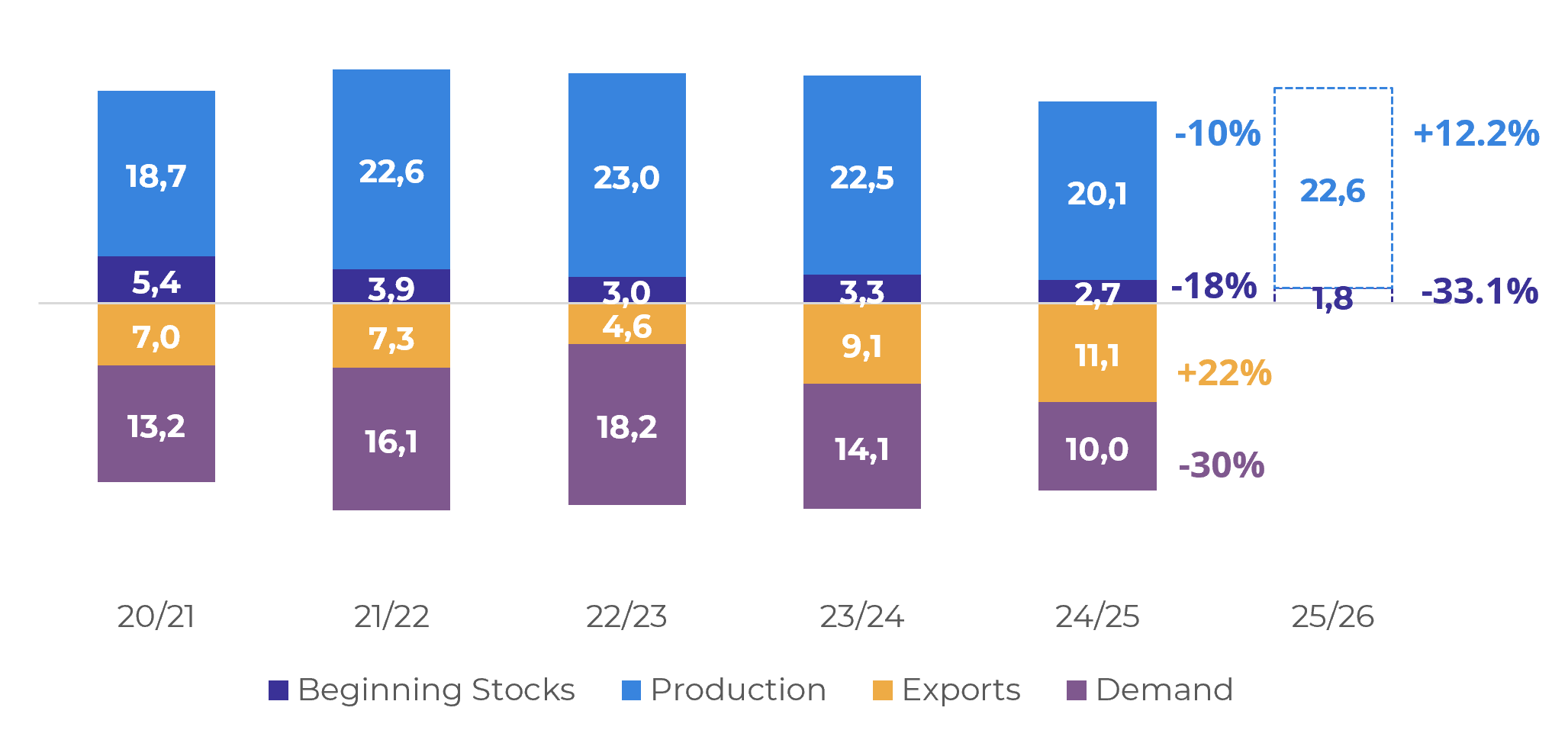
Source: Hedgepoint
As a result, Brazilian grain supplies could tighten in the coming months, particularly given the current level of commercialization. In October, around 70% of the Brazilian 24/25 crop were already sold. By variety, around 67% of the 24/25 crop has been sold in Arabica and 76% in Robusta.
The volume of the Brazilian crop sold for both varieties is already above average and that of previous crops, which is likely to lead to a more pronounced decline in sales at the end of 2024 and the beginning of 2025. Thus, even with the expected postponement of the EUDR and a possible drop in European imports at the beginning of 2025, the tighter supply of Brazilian coffee on the market could still support prices, especially if the Arabica crop failure is confirmed on 25/26 September.
Brazil: Farmer Selling – Arabica (%)
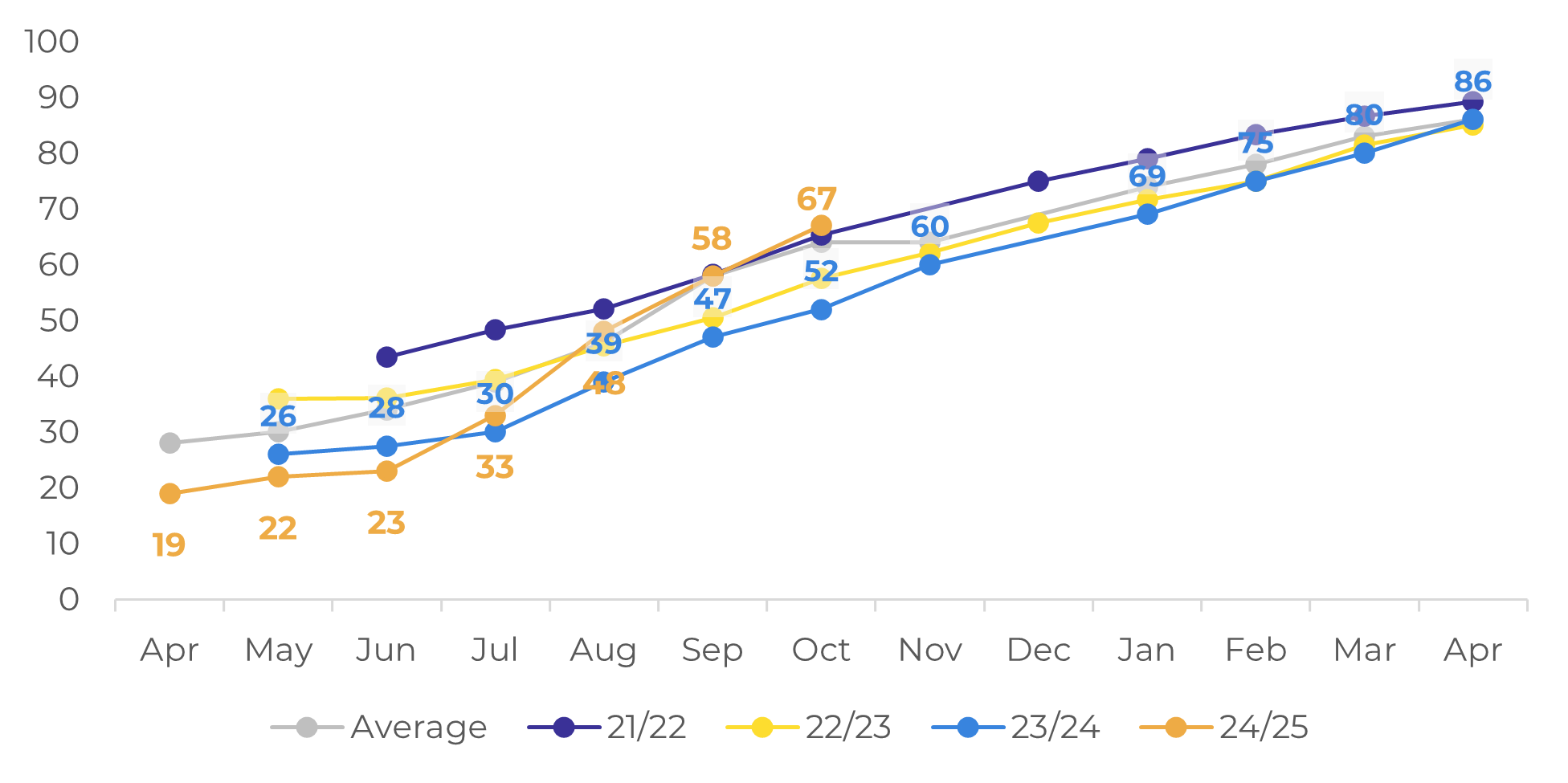
Source: Safras & Mercado
Brazil: Farmer Selling – Conilon/Robusta (%)
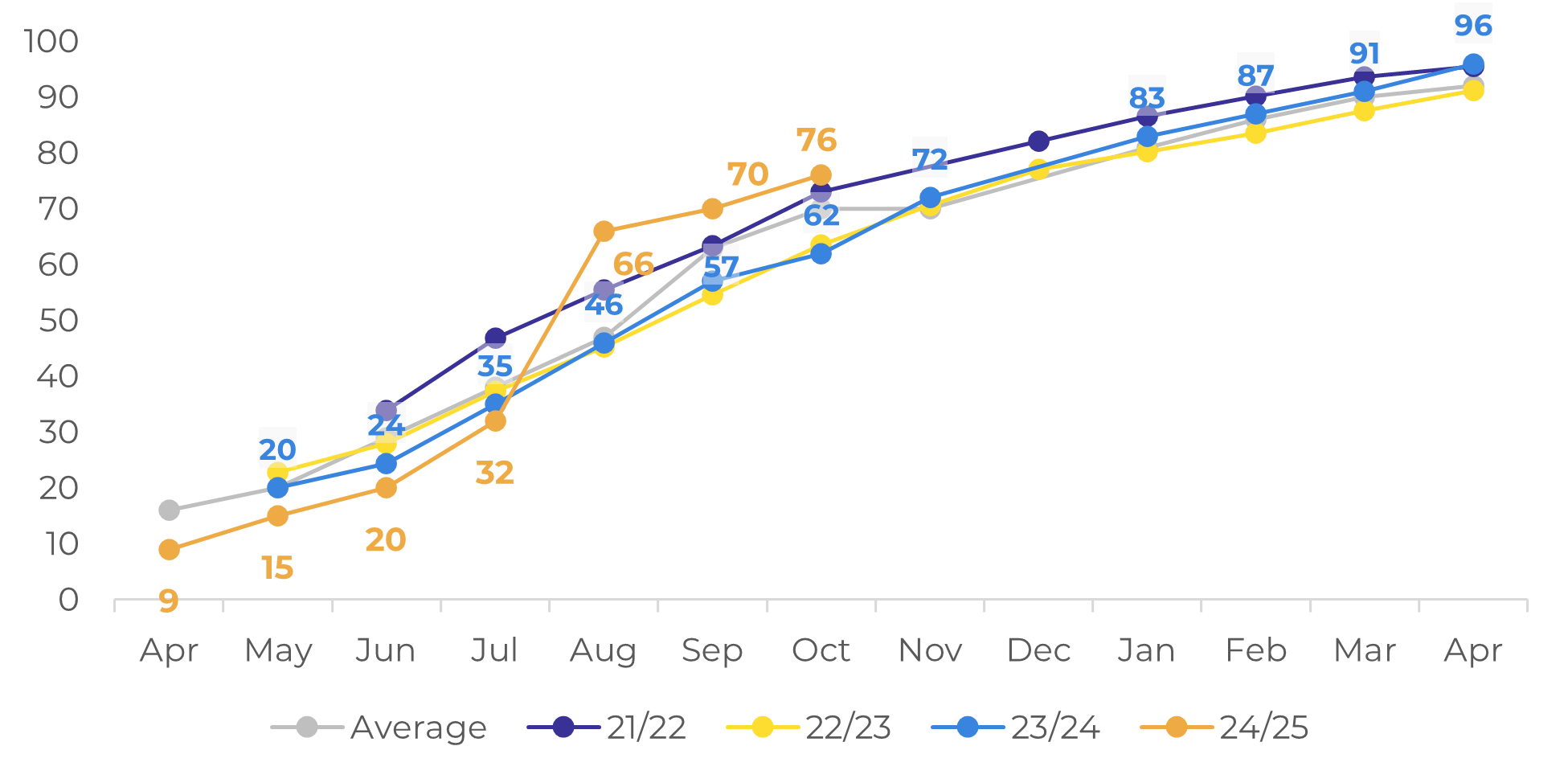
Source: Safras & Mercado
In addition to Brazil, it's worth remembering that Indonesia is also entering its off-season, which could reduce shipments in the coming months. As a result, the global coffee supply would be mainly driven by countries that harvest coffee between the end and beginning of the year.
In these origins, such as Vietnam, Central America, and Colombia, the 24/25 season harvest tends to intensify between December and January. They could, therefore, add some volume to the market, exerting downward pressure in the short term. On the other hand, producers are more capitalized this season due to higher prices in 2023 and 2024, which could also lead to a slower pace of trade and maintain some support for prices. In Vietnam, for example, differentials have already reacted in recent weeks as producers continue to withdraw from the market while demand has shown signs of picking up.
In these origins, such as Vietnam, Central America, and Colombia, the 24/25 season harvest tends to intensify between December and January. They could, therefore, add some volume to the market, exerting downward pressure in the short term. On the other hand, producers are more capitalized this season due to higher prices in 2023 and 2024, which could also lead to a slower pace of trade and maintain some support for prices. In Vietnam, for example, differentials have already reacted in recent weeks as producers continue to withdraw from the market while demand has shown signs of picking up.
In addition, except for Colombia, these origins are expected to have a slightly smaller crop in 24/25. Thus, at the current pace of exports and demand, we expect a reduction in ending stocks for most origins in 24/25, which could also contribute to a 'tighter' trade flow in the coming months.
Origins: Arabica Ending Stocks and Stock/Use Ratio (M bags)
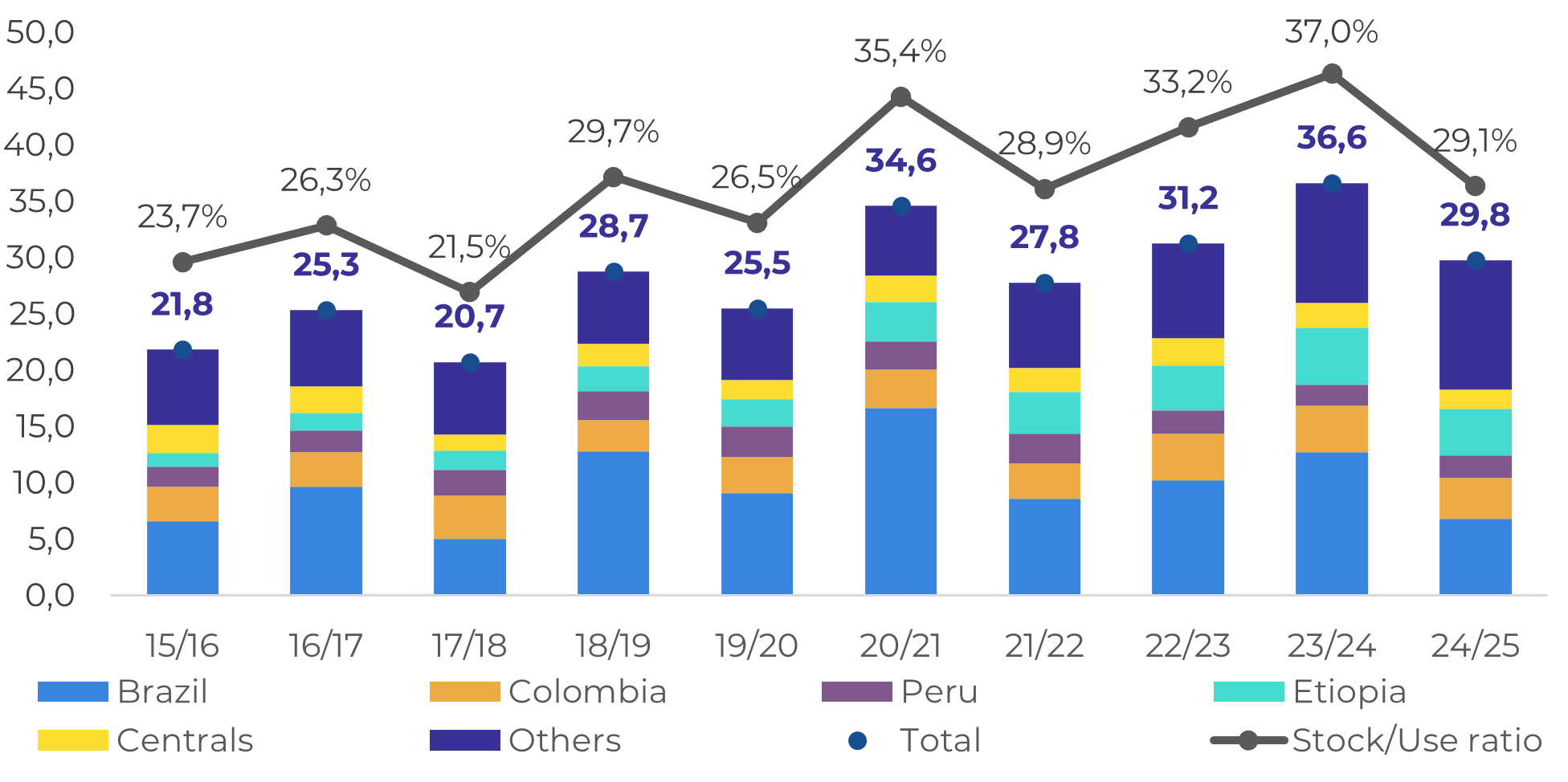
Source: Hedgepoint
Origins: Robusta Ending Stocks and Stock/Use Ratio (M bags)
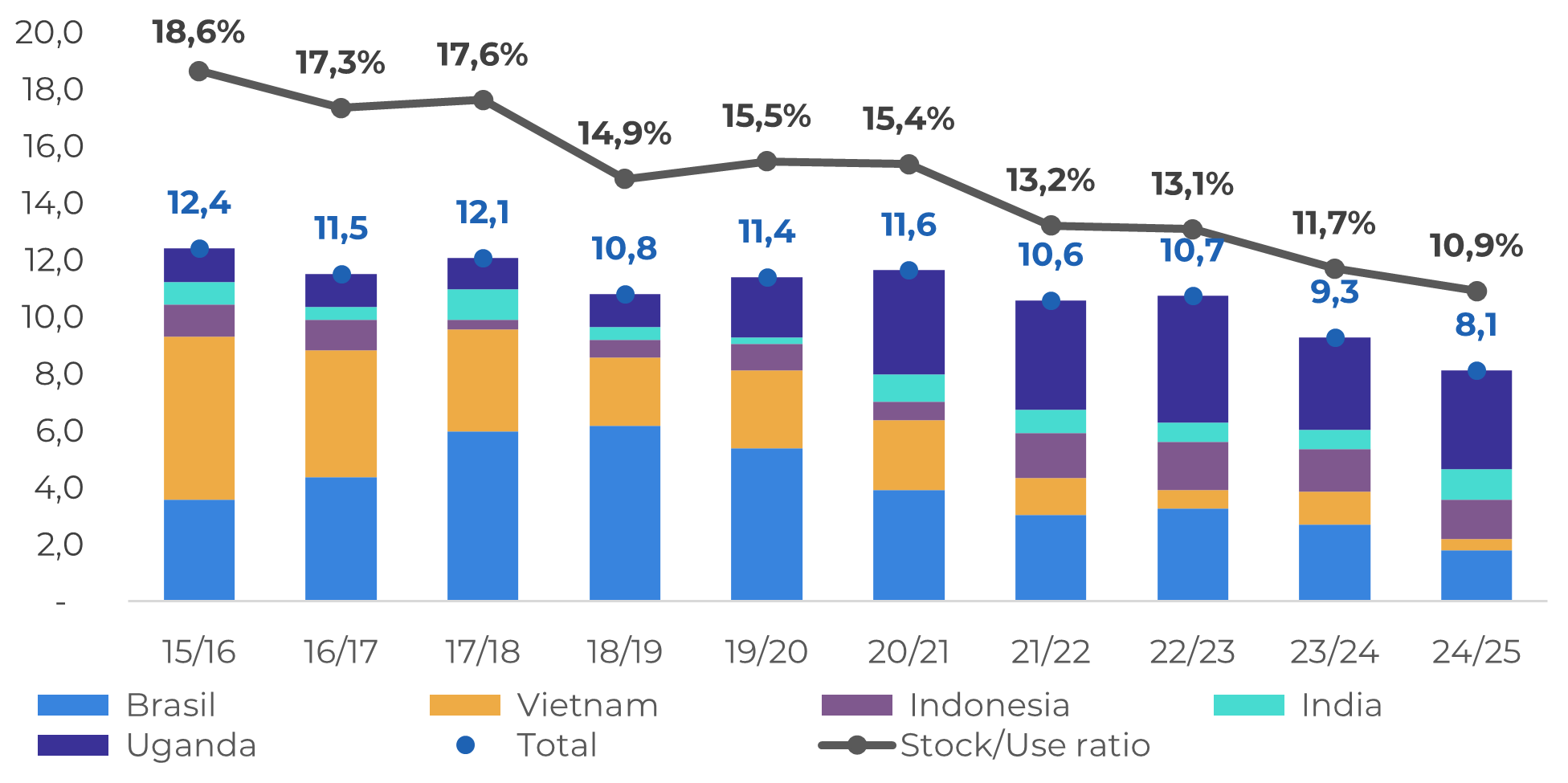
Source: Hedgepoint
In Summary
After a bearish period between late October and early November, the coffee market seems to have returned to bullish territory towards the end of the month, reflecting growing supply concerns. The main support came from expectations of lower Brazilian Arabica production in 25/26 due to adverse weather conditions through September. The overall picture is also one of tighter supplies in 24/25.
In Brazil, in addition to a smaller than expected crop in 24/25, its farmer selling is above average for the period, with producers in no hurry to sell their grains. In other origins, such as Vietnam, producers are also withdrawing from the market, supporting prices.
In addition, several origins will have a slightly smaller crop in 24/25, with carry-over stocks expected to be reduced in the world's largest coffee producers. As a result, we may see tighter supply in the Brazilian off-season, which could support prices in late 2024 and early 2025, mainly the March and May contracts.
Weekly Report — Coffee
Written by Laleska Moda
laleska.moda@hedgepointglobal.com
Reviewed by Livea Coda
livea.coda@hedgepointglobal.com
livea.coda@hedgepointglobal.com
www.hedgepointglobal.com
Disclaimer
This document has been prepared by Hedgepoint Global Markets LLC and its affiliates (“HPGM”) solely for informational and instructional purposes, without the purpose of instituting obligations or commitments to third parties, nor is it intended to promote an offer, or solicitation of an offer of sale or purchase relating to any securities, commodities interests or investment products. Hedgepoint Commodities LLC (“HPC”), a wholly owned entity of HPGM, is an Introducing Broker and a registered member of the National Futures Association. The trading of commodities interests such as futures, options, and swaps involves substantial risk of loss and may not be suitable for all investors. Past performance is not necessarily indicative of future results. Customers should rely on their own independent judgement and outside advisors before entering in any transaction that are introduced by the firm. HPGM and its associates expressly disclaim any use of the information contained herein that directly or indirectly result in damages or damages of any kind. In case of questions not resolved by the first instance of customer contact (client.services@hedgepointglobal.com), please contact our internal ombudsman channel (ombudsman@hedgepointglobal.com) or 0800-878- 8408/ouvidoria@hedgepointglobal.com (only for customers in Brazil)
Contact us
hedgepointhub.support@hedgepointglobal.com
ouvidoria@hedgepointglobal.com
Funchal Street, 418, 18º floor - Vila Olímpia São Paulo, SP, Brasil
Check our general terms and important notices.
This page has been prepared by Hedgepoint Schweiz AG and its affiliates (“Hedgepoint”) solely for informational and instructional purposes, without the purpose of instituting obligations or commitments to third parties, nor is it intended to promote an offer, or solicitation of an offer of sale or purchase relating to any securities, commodities interests or investment products. Hedgepoint and its associates expressly disclaim any use of the information contained herein that directly or indirectly result in damages or damages of any kind. Information is obtained from sources which we believe to be reliable, but we do not warrant or guarantee the timeliness or accuracy of this information. The trading of commodities interests such as futures, options, and swaps involves substantial risk of loss and may not be suitable for all investors. You should carefully consider wither such trading is suitable for you in light of your financial condition. Past performance is not necessarily indicative of future results. Customers should rely on their own independent judgement and/or advisors before entering in any transaction.Hedgepoint does not provide legal, tax or accounting advice and you are responsible for seeking any such advice separately.Hedgepoint Schweiz AG is organized, incorporated, and existing under the laws of Switzerland, is filiated to ARIF, the Association Romande des Intermédiaires Financiers, which is a FINMA-authorized Self-Regulatory Organization. Hedgepoint Commodities LLC is organized, incorporated, and existing under the laws of the USA, and is authorized and regulated by the Commodity Futures Trading Commission (CFTC) and a member of the National Futures Association (NFA) to act as an Introducing Broker and Commodity Trading Advisor. HedgePoint Global Markets Limited is Regulated by the Dubai Financial Services Authority. The content is directed at Professional Clients and not Retail Clients. Hedgepoint Global Markets PTE. Ltd is organized, incorporated, and existing under the laws of Singapore, exempted from obtaining a financial services license as per the Second Schedule of the Securities and Futures (Licensing and Conduct of Business) Act, by the Monetary Authority of Singapore (MAS). Hedgepoint Global Markets DTVM Ltda. is authorized and regulated in Brazil by the Central Bank of Brazil (BCB) and the Brazilian Securities Commission (CVM). Hedgepoint Serviços Ltda. is organized, incorporated, and existing under the laws of Brazil. Hedgepoint Global Markets S.A. is organized, incorporated, and existing under the laws of Uruguay. In case of questions not resolved by the first instance of customer contact (client.services@Hedgepointglobal.com), please contact internal ombudsman channel (ombudsman@hedgepointglobal.com – global or ouvidoria@hedgepointglobal.com – Brazil only) or call 0800-8788408 (Brazil only).Integrity, ethics, and transparency are values that guide our culture. To further strengthen our practices, Hedgepoint has a whistleblower channel for employees and third-parties by e-mail ethicline@hedgepointglobal.com or forms Ethic Line – Hedgepoint Global Markets.Security note: All contacts with customers and partners are conducted exclusively through our domain @hedgepointglobal.com. Do not accept any information, bills, statements or requests from different domains and pay special attention to any variations in letters or spelling, as they may indicate a fraudulent situation.“HedgePoint” and the “HedgePoint” logo are marks for the exclusive use of HedgePoint and/or its affiliates. Use or reproduction is prohibited, unless expressly authorized by HedgePoint. Furthermore, the use of any other marks in this document has been authorized for identification purposes only. It does not, therefore, imply any rights of HedgePoint in these marks or imply endorsement, association or seal by the owners of these marks with HedgePoint or its affiliates.
We have updated our Terms & Conditions to reflect improvements to our platform, data handling practices, and the overall experience we provide to our clients.
To continue using the Hedgepoint HUB, please review and accept the updated terms.

